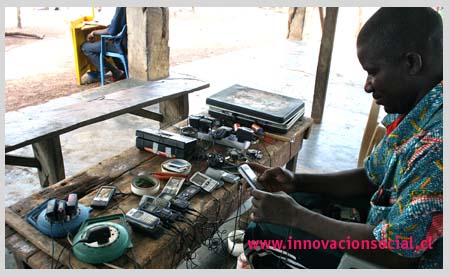Posts filed under ‘Media’
Dance and Design, this is revolution
 Pic: CM [Aleta teaching students to improvise and flock, 2012]
Pic: CM [Aleta teaching students to improvise and flock, 2012]
I have always been a wannabe contemporary dancer, but always stayed in the basic-amateur side. But really, never thought this kind of art could relate to design in such a smooth way. This, until I met Aleta Hayes at while doing my research at Stanford Uni’s CDR. She made a whole session of improvisation with the design students from the Needfinding course at the DSchool. This is one of the courses that, thanks to Anne Fletcher and Michael Barry, I am working with for my design-anthropology doctoral research. Throughout a series of exercises, which for the first time DIDN’T SEEM CHEESY AT ALL [sometimes consultancies love to take over these exercises but without hiring the right people], she demonstrated the power of empathy and leadership. Leadership through flocking exercises: “… try to become like the people you are working with…”, which is how we commonly learn a choreography… and Empathy: certain exercises that “make you take over others people’s quality...”
DANCE YOUR PHD & DANCING POWERPOINT
Aleta Hayes, performer and Stanford lecturer, opened a whole new area in my mind. And I really mean it when I say it wasn’t cheesy, it made sense, just said by her in the way she said it sounded like easy-adoptable-theory. And even though I am working with some aspects of choreography for analyzing team performance, I had never thought to use dance in the ways she presented.
Video: TED X Brussels
She also showed this video of TED X Brussels [it had to be here, the only place where a circle of my friends, (more…)
Conditional Design
 Pic: Conditional Design
Pic: Conditional Design
INTRO:
Through the work of Casey Reas , Diego Gómez got to know the work of a Dutch collective called: “Conditional Design“. They have published an interesting manifiesto, which is the one he is exploring in this post. Conditional Design entails: THE PROCESS IS THE PRODUCT AND LOGIC IS OUR TOOL [please look at the manifesto for further statements]. As an MA candidate, Diego had the possibility to help in a workshop about “Conditional Drawing” based on the statements that this Dutch collective explore. During his own course, back in Chile, he implemented a similar idea with students from Digital Design at UDD in Santiago. Gómez enfatizes in the fact that: “The exercise proved to be an interesting step to to start thinking about: what do we design when we design with the and from technology. If this sounds benign to you, is because you haven’t really reflected about it”.
By Diego Gómez
MA UCLA
designer, media worker & academic enthusiast
Incluso en la más intrincada definición de diseño, es imposible negar el vínculo de la disciplina con la tecnología y los medios. Más aún, habemos quienes creemos que el diseño está íntimamente ligado a la evolución de estos constructos sociales. Para bien y para mal. Para el diseñador, reflexionar sobre esta ligazón debe ser parte fundamental de su hacer. Entender cual es rol de la disciplina en la sociedad implica analizar cada día qué significa el crear con y desde la tecnología y los medios, y por lo mismo, cómo éstos condicionan el diseño.


Pic: Diego’s Workshop at UDD
Esta inquietud no es nueva y se podría decir que es (more…)
Designing for real autonomy
Pic: Weekday Market in Weichau, Ghana [CM]
Mobility and the possibility to be ubiquitous should be afforded by the so called “mobile devices”… yet, how autonomous are they? Are batteries meant to last? Are they rechargeable? These pictures where taken in Weichau, Ghana. Close to the frontier with Burkinafaso. Even though the non-autonomy of these artifacts allows the start-up of small entrepreneurs who find the way to make business profit out of it… are these products being democratic enough?  Pic: Accra, Ghana. Check on the small sign “We Charge Phones” [CM]
Pic: Accra, Ghana. Check on the small sign “We Charge Phones” [CM]
People in rural areas, that do not have access to electricity, are obliged to pay in the day-market for a battery recharge provided by a diesel generator. They actually end paying more than they should, and the usage of their mobile devices is limited. The mobile telephone industry could consider considering the impact they have in places like Ghana [where you can find cell-phone antennas everywhere]. They should afford the real mobility and autonomy of their products if they are really committed to fulfill the needs of these markets [which are not exactly the same that the European or North American ones…]
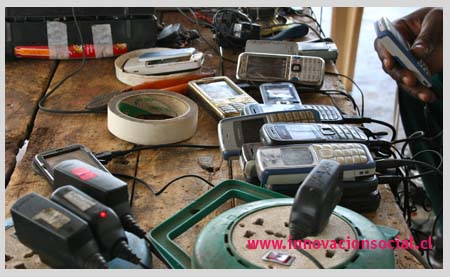 Pic: Market, Weichau [CM]
Pic: Market, Weichau [CM]
Is Google making us stupid? How the Internet is changing us….
 Pic: Students playing video games at NCSU Library [CM]
Pic: Students playing video games at NCSU Library [CM]
There is a lot of information on the benefits of adopting new technologies. It is no surprise that the computer helps us manage cognitive loads or limitations that we have as humans. Computers could be considered cognitive artifacts, Norman says: “those artificial devices that maintain, display, or operate upon information in order to serve a representational function and that affect human cognitive performance.” [Norman 1991, p.17] But, today, are computing technologies really contributing to our cognitive skills? In his new book “The Shallows: What Internet is doing to our Brains” , Nicolas Carr places upfront the facts behind an early adoption of Internet. How Internet shapes human thought becomes evident. Are we losing our ability to read and think deeply because of the Internet?
 Pic: Apple Store NYC [CM]
Pic: Apple Store NYC [CM]
In May 2004, Wired Magazine published an article talking about how Internet rewired our brains. Experiments to monitor brain activity with an MRI, done by Gary Small [UCLA] p showed that Brain activity of the experienced surfers was far more extensive than that of the newbies, particularly in areas of the prefrontal cortex associated with problem-solving and decision-making. “Five hours on the Internet and the naive subjects had already rewired their brains,” Small (more…)
Digital Humanities: The dialogue between the Geeks and the Poets
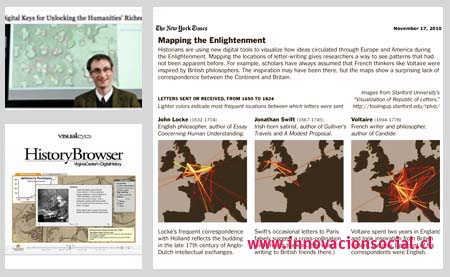 PIC: NY Times
PIC: NY Times
Not long ago, the NY Times published the article: “Digital Keys for Unlocking the Humanities’ Riches”. The article mentions the technological exploration of data coming from the humanities under an alliance between what Patricia Cohen calls: The Geeks and the Poets. Upfront, Cohen faces the audience with a bold statement when using the word: unlocking. This idea is pretty strong. The knowledge coming from the humanities seemed to have been “locked”, being a privilege reserved for some savvy scholars.
Today, we live in an era where we, simple individuals, have become very sensible for information. And this seems to be an increasing trend for about fifteen years now. With the rise of the open source technologies and the availability of raw and public data on the net, every human has the right to take well-informed decisions. In another article from the NY Times “A Data Driven Life” Gary Wolf explores the idea of ordinary individuals getting interested in plain data. I make this link in order to intensify my idea that, today, broader audiences are interested in being well informed. This information can be personal tracking for taking decisions, or simply going to “shop” for information on the web. There is a phenomenon of “Data Democratization” happening and the humanities can’t be left behind. (more…)
AIGA Design/Education conference: Yay! the content is up
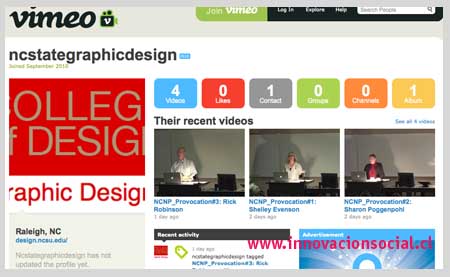 The AIGA conference on education and design just ended. Hosted by NC State’s Graphic Design program, it became to be the start point for a serious redefinition of the Designer’s practice. Some of the speakers and participants included: John Thackara [Doors of Perception, Social Economies and Sustainability], Dori Tunstall [Swinburne University, Design Anthropologist], Rick Robinson [E-Lab, Sapient, Continuum– Collaboration], Sharon Poggenpohl [Ex IIT, Hong Kong Poytechnic, DEsign Integrations and a Design Research culture from scratch], Shelley Evenson [Ex Carnegie Mellon, now Microsoft Social – Service Design], David Small [MIT Media Lab, now Small Design Firm], (more…)
The AIGA conference on education and design just ended. Hosted by NC State’s Graphic Design program, it became to be the start point for a serious redefinition of the Designer’s practice. Some of the speakers and participants included: John Thackara [Doors of Perception, Social Economies and Sustainability], Dori Tunstall [Swinburne University, Design Anthropologist], Rick Robinson [E-Lab, Sapient, Continuum– Collaboration], Sharon Poggenpohl [Ex IIT, Hong Kong Poytechnic, DEsign Integrations and a Design Research culture from scratch], Shelley Evenson [Ex Carnegie Mellon, now Microsoft Social – Service Design], David Small [MIT Media Lab, now Small Design Firm], (more…)
PDF On Learning Resources for integrating Design Thinking in school education
Due to the success of Rebecca Knowe’s [NCSU MGD] last post on education, we add here the PDF of her final work [under a Creative Commons License]:
DOWNLOAD POSTER PDF
Resources for integrating Design Thinking in Education
By: Rebecca Knowe
MGD Candidate NC State University
Featured project in the AIGA 2010 Conference on Education 
Pic: Rebecca’s visual poster synthesizing available media tools 2010
Design thinking has become a popular concept for business leaders to study, and many have written on its potential influence on business strategy. My current graphic design work is taking me into studying a less-known combination—design thinking applied to education. Designing deals with open-ended, contextual problems, and requires thinking abilities far beyond rote memorization.
SUPPORTING THE REQUIREMENTS OF THE 21st CENTURY LABOR MARKET
The twenty-first century labor market requires similar competencies in problem-solving, decision-making, knowing how to learn, self-management, and other skills typically fostered by design thinking. This list of competencies comes from the U.S. Department of Labor’s 1992 SCANS (Secretary’s Commission on Achieving Necessary Skills) study, and it has informed a large part of my research thus far.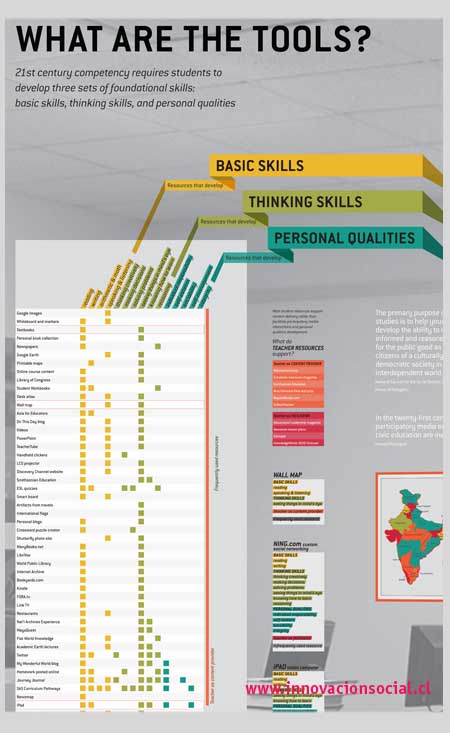
Under the  (more…)
(more…)
